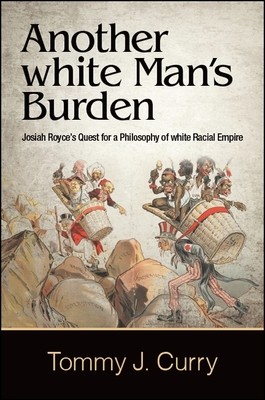
- We will send in 10–14 business days.
- Author: Tommy J Curry
- Publisher: State University of New York Press
- ISBN-10: 1438470738
- ISBN-13: 9781438470733
- Format: 15.5 x 23.1 x 2.3 cm, hardcover
- Language: English
- SAVE -10% with code: EXTRA
Reviews
Description
Winner of the 2020 Josiah Royce Prize in American Idealist Thought presented by the Josiah Royce SocietyAnother white Man's Burden performs a case study of Josiah Royce's philosophy of racial difference. In an effort to lay bare the ethnological racial heritage of American philosophy, Tommy J. Curry challenges the common notion that the cultural racism of the twentieth century was more progressive and less racist than the biological determinism of the 1800s. Like many white thinkers of his time, Royce believed in the superiority of the white races. Unlike today however, whiteness did not represent only one racial designation but many. Contrary to the view of the British-born Germanophile philosopher Houston S. Chamberlain, for example, who insisted upon the superiority of the Teutonic races, Royce believed it was the Anglo-Saxon lineage that possessed the key to Western civilization. It was the birthright of white America, he believed, to join the imperial ventures of Britain--to take up the white man's burden. To this end he advocated the domestic colonization of Blacks in the American South, suggested that America's xenophobia was natural and necessary to protecting the culture of white America, and demanded the assimilation and elimination of cultural difference for the stability of America's communities. Another white Man's Burden reminds philosophers that racism has been part of the building blocks of American thought for centuries, and that this must be recognized and addressed in order for its proclamations of democracy, community, and social problems to have real meaning.
EXTRA 10 % discount with code: EXTRA
The promotion ends in 19d.16:32:43
The discount code is valid when purchasing from 10 €. Discounts do not stack.
- Author: Tommy J Curry
- Publisher: State University of New York Press
- ISBN-10: 1438470738
- ISBN-13: 9781438470733
- Format: 15.5 x 23.1 x 2.3 cm, hardcover
- Language: English English
Another white Man's Burden performs a case study of Josiah Royce's philosophy of racial difference. In an effort to lay bare the ethnological racial heritage of American philosophy, Tommy J. Curry challenges the common notion that the cultural racism of the twentieth century was more progressive and less racist than the biological determinism of the 1800s. Like many white thinkers of his time, Royce believed in the superiority of the white races. Unlike today however, whiteness did not represent only one racial designation but many. Contrary to the view of the British-born Germanophile philosopher Houston S. Chamberlain, for example, who insisted upon the superiority of the Teutonic races, Royce believed it was the Anglo-Saxon lineage that possessed the key to Western civilization. It was the birthright of white America, he believed, to join the imperial ventures of Britain--to take up the white man's burden. To this end he advocated the domestic colonization of Blacks in the American South, suggested that America's xenophobia was natural and necessary to protecting the culture of white America, and demanded the assimilation and elimination of cultural difference for the stability of America's communities. Another white Man's Burden reminds philosophers that racism has been part of the building blocks of American thought for centuries, and that this must be recognized and addressed in order for its proclamations of democracy, community, and social problems to have real meaning.


Reviews